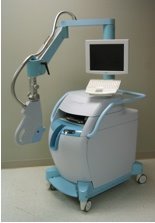U of Iowa among leaders in cervical cancer detection

Iowa City, IA
University of Iowa Hospitals in Iowa City is using a new technology being called the most significant advance in more than 50 years for detecting cervical cancer.
Des Moines venture capitalist John Pappajohn is an investor in the technology, which a California company hopes to roll out nationally later this year.
The machine detects cancerous and pre-cancerous cells by measuring ultra-violet light waves reflected off individual cells, said Dr. Colleen Kennedy of the U of I's obstetrics and gynecology department.
Advertisement
http://www.westbankiowa.com/reward_me_checking
The technology was recently approved by the U.S. Food and Drug Administration and is now undergoing post-approval testing at five hospitals, including the one in Iowa City.
Current detection methods for cervical cancer require a doctor to examine tissue samples under a microscope for abnormalities. Successful detection of pre-cancerous tissue depends on the skill of the person doing the reading, Kennedy said.
"It's very user-dependent," she said. "Three different people could see three different things."
"This new technology takes the art out of it, and makes it a science," Kennedy added.
Early tests show the new technology is capable of finding 25 percent more precancerous situations than current methods, according to Spectra Science Inc., the San Diego-based company that owns the technology.
What the experts don't know, Kennedy said, is what, if any, difference earlier detection will have on morality rates.
Spectra has similar FDA-approved technology that is being used to detect colon cancer, said Jim Hitchen, the company's chief executive.
He said the company is seeking FDA approval for a third test for cancer of the esophagus, an especially deadly type. It hopes to have that approval by the end of the year.
Spectra's Web site says the new technology might also work for early detection of other cancers, including lung cancer.
The machine developed by Spectra for cervical cancer tests is called the LUMA Cervical Imaging System. It sells for about $175,000, Hitchen said, although the company will also lease the equipment or charge on a per use basis.
After the FDA gave approval for the sale of the machines, Pappajohn called for U of I Hospitals, where he is a major benefactor, to be included in a post-approval study.
To help facilitate those tests, Pappajohn and his wife, Mary, agreed to pay for administering the LUMA test in Iowa City for any Iowa woman who cannot afford it.
Kennedy said the hospital has not figured out what the cost of individual tests would be, but she said it would probably be $500 or less.
The U of I began using the machine two weeks ago and has already tested eight women, she said.
The real value of the test, Kennedy said, will not be whether it detects precancerous conditions that would have been missed in the past.
"We know it can do that," she said.
What the medical profession needs to find out now, she said, is whether additional early detection has a significant impact on mortality rates.
More than 11,000 women in the United States are diagnosed with cervical cancer each year, including 350 to 400 Iowans, and nearly a third of them die of the cancer.
Forty years ago, cervical cancer was the leading cause of cancer death for women, according to the U.S. Centers for Disease Control and Prevention. Now it is No. 13 because of advances in treatment following early detection.
Cervical cancer "is highly curable when found and treated early," the disease center said.
Candidates for the LUMA test are women who test positive on a pap smear, Kennedy said.
Currently, she said, women who test positive undergo a second test, called a colposcopy.
The LUMA test is less invasive than a pap smear or a colposcopy, Kennedy said.

0 Comments:
Post a Comment
<< Home